Related Research Articles

Igbo is the principal native language of the Igbo people, an ethnic group from Eastern Nigeria.
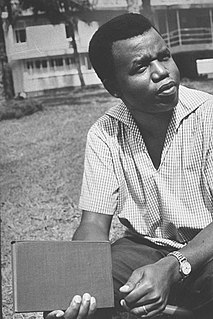
Chinua Achebe was a Nigerian novelist, poet, and critic who is regarded as the dominant figure of modern African literature. His first novel and magnum opus, Things Fall Apart (1958), occupies a pivotal place in African literature and remains the most widely studied, translated and read African novel. Along with Things Fall Apart, his No Longer at Ease (1960) and Arrow of God (1964) complete the so called "African Trilogy"; later novels include A Man of the People (1966) and Anthills of the Savannah (1987). He is often referred to as the "father of African literature", although he vigorously rejected the characterization.

The Igbo people are an ethnic group in Nigeria. They are majorly found in Abia, Anambra, Ebonyi, Enugu, and Imo States. A sizable Igbo population is also found in Delta and Rivers States. Large ethnic Igbo populations are found in Cameroon, Gabon, and Equatorial Guinea, as well as outside Africa. There has been much speculation about the origins of the Igbo people as it is unknown how exactly the group came to form. Geographically, the Igbo homeland is divided into two unequal sections by the Niger River – an eastern and a western section. The Igbo people are one of the largest ethnic groups in Africa.
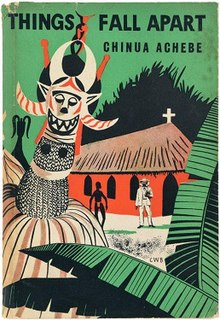
Things Fall Apart is the debut novel by Nigerian author Chinua Achebe, first published in 1958. It depicts pre-colonial life in the southeastern part of Nigeria and the invasion by Europeans during the late 19th century. It is seen as the archetypal modern African novel in English, and one of the first to receive global critical acclaim. It is a staple book in schools throughout Africa and is widely read and studied in English-speaking countries around the world. The novel was first published in the UK in 1962 by William Heinemann Ltd, and became the first work published in Heinemann's African Writers Series.
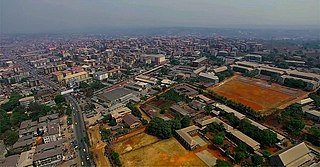
Onitsha is a city located on the eastern bank of the Niger River, in Anambra State, Nigeria. A metropolitan city, Onitsha is known for its river port and as an economic hub for commerce, industry, and education. It hosts the Onitsha Main Market, the largest market in Africa in terms of geographical size and volume of goods.

Samuel Ajayi Crowther, was a Nigerian linguist, clergyman, and the first African Anglican bishop of West Africa. Born in Osogun, he and his family were captured by slave raiders when he was about twelve years old. This took place during the Yoruba civil wars, notably the Owu wars of (1821-1829),where his village Oshogun was sacked. Ajayi was later on resold to Portuguese slave dealers, where he was put on board to be transported to the New World through the Atlantic.
Ogidi is an Igbo town, the headquarters of Idemili North Local Government area, Anambra State, Nigeria. It has an estimated population of 70,000 and has as its neighbours Abatete, Ṅkpọr, Ụmụnnachị, Ụmụoji, Ogbụnike and Ụmụdiọka. Ogidi is best known for its mid-July annual Nwafor Festival, an 11-day festival in July that takes place after cultivation of yams and included prayers for a good season. It usually starts on the first Friday of the month.
Oyinbo is a Yoruba-Nigerian word used to refer to the early Caucasians. In the early 1470s when the first Portuguese berth in Eko, presently Lagos. Oyinbo is generally used to refer to a person of European descent, African people perceived to not be culturally Sub-Saharan Africans, or nowadays every other people of any race considered light-skinned. The word is generally understood by most Nigerians and many Africans.
Wilberforce William Chukudinka Echezona was a Nigerian musicologist and a pioneer teacher of music in Nigerian universities. He was the first Igbo man to be educated at London's Trinity College of Music, and the first African to obtain a degree in music education in the United States, where he received a PhD from Michigan State University in 1963.

Charles Theophilus Ewald Rhenius was a German born missionary of the Church Mission Society (CMS). He was the first CMS missionary to arrive at India. For his missionary work in the Tirunelveli district he came to be known as the "Apostle of Tirunelveli". He was involved in the attempt to revise the Fabricius version of the Tamil Bible and also published a Tamil grammar book. Rhenius’ split from the Anglican Church in 1830 and started his own congregation. Rhenius' work was recognized in 1980 by the Reverend Daniel Abraham, the then Church of South India (CSI) bishop of Tirunelveli diocese. Rhenius's work was given official recognition by the Anglican Communion during the Tirunelveli diocese bicentenary celebration in 1980, in which, all the bishops, including Anglican bishop Stephen Neill and all the presbyters took an oath in front of the tomb of Rev Rhenius to follow the path of the resting soul, regard to evangelism.
Diocese On the Niger is the mother diocese of the Church of Nigeria. It is one of 10 Anglican dioceses in the Anglican Province of the Niger within the Church of Nigeria. The diocese was created in 1864 as the Diocese of Western Equatorial Africa. In 1920 the Diocese of Equatorial West Africa was divided into two: an eastern part and a western part. A part of the Diocese on the Niger was subsequently carved out in 1946 to create the Niger Delta Diocese.

Benjamin Bailey was a British Church Mission Society missionary in Kerala, India for 34 years. He was ordained 1815 and moved to Kerala in 1816 where he found a mission station in Kottayam, and in 1821 he established a Malayalam printing press. He translated the Bible into Malayalam, in 1846 published the first English-Malayalam dictionary, and in 1849 published the first Malayalam-English dictionary.
Karl Wilhelm Isenberg, spelt or known by names Carl Wilhelm Isenberg or Charles William Isenberg or C. W. Isenberg or Carl W. Isenberg or Charles Isenberg, was a German Church Missionary Society missionary and linguist to East Africa and Western India.
The Bible, or portions of it, have been translated into over 1,000 languages of Africa. Many of these are indexed by the Forum of Bible Agencies, Find.Bible site and available online in text and audio form, as print on demand versions, or through churches and book sellers. This effort continues. Not all are (yet) listed below.
Robert McDonald was an Anglican missionary among First Nation peoples in Canada, particularly in the northwest Arctic.
John William Tims, was born in Oxford in England on 24 December 1857. He was a DD was Archdeacon of Calgary from 1898 to 1912.
The New Zealand Church Missionary Society is a mission society working within the Anglican Communion and Protestant, Evangelical Anglicanism. The parent organisation was founded in England in 1799. The Church Missionary Society (CMS) sent missionaries to settle in New Zealand. The Rev. Samuel Marsden, the Society's Agent and the Senior Chaplain to the New South Wales government, officiated at its first service on Christmas Day in 1814, at Oihi Bay in the Bay of Islands, New Zealand.
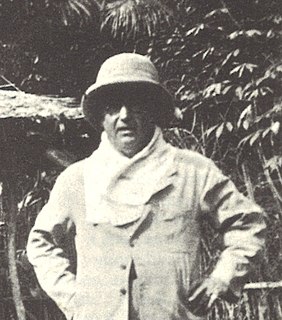
George Thomas Basden was Archdeacon of the Niger from 1926 until 1936.
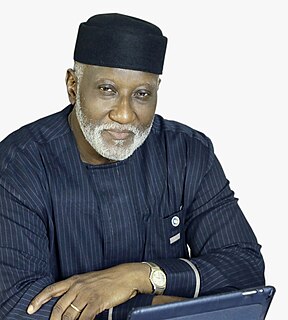
Oseloka Henry Obaze (OHO) is a native of Ochuche Umuodu in Anambra State, Nigeria. He is a Nigerian diplomat, politician, author and a retired United Nations official who served the organization as an international civil servant between 1991 and 2012. Prior to working at the United Nations, he worked as a career Foreign Service Officer (FSO) in the Nigerian Diplomatic Service from 1982-1991. Following his retirement from the United Nations, Oseloka H. Obaze served as Secretary to the State Government of Anambra State, Nigeria from June, 2012 till June, 2015 under former Governor Peter Obi and incumbent Governor Willie Obiano.
Michael Oguejiofo Ajegbo was a Nigerian lawyer and politician who was Attorney-General of Nigeria's Eastern Region during Nigeria's First Republic.
References
- ↑ "Diocese of Owerri (Anglican Communion)". www.owerrianglican.org.
- ↑ DACB
- 1 2 3 4 5 6 7 8 9 "Dennis and the Igbo Bible". Rev Tom Dennis. Retrieved 2020-09-13.
- ↑ Okwu, A. S. O., Igbo Culture and the Christian Missions, 1857–1957: Conversion in Theory and Practice, p. 165: Lanham, Maryland: Rowman & Littlefield; 2010 ISBN 978-0-7618-4884-4.
- ↑ The Clergy List, London: Kelly's, 1913.
- ↑ Unattached Members, Durham University Calendar 1903-04, 1904, p. 207
- 1 2 Journal of Niger Delta Studies 1:2, p. 66, 1977.
- ↑ Fulford, Ben (2002). "An Igbo Esperanto: A History of the Union Ibo Bible 1900–1950". Journal of Religion in Africa. 32 (4): 457–501. ISSN 0022-4200.
- ↑ Ernest Emenyo̲nu, Iniobong I. Uko, Emerging Perspectives On Chinua Achebe, p. 435, 2004 - 459: "To Achebe, Union Igbo was a mechanical standardization, and its use in the translation of the Bible into Igbo in 1913 was a legacy detrimental to the growth and development of Igbo language and culture."
- ↑ Frances W. Pritchett (ed.). "A History of the Igbo Language". www.columbia.edu. Retrieved 13 September 2020.
- ↑ Dennis, Thomas John, ed. (1923). Dictionary of Ibo Language. English-Ibo. Sydney Richard Smith (Preface). Lagos: Church Missionary Society. OCLC 557887388.
- ↑ "About Us", DOBA.
- ↑ John Goodchild (Rev. Canon), Dennis and the Ibo Bible: The Missionary Work of Tom Dennis in Nigeria and the Creation of the Union Ibo Language, 0954637100, 2003.